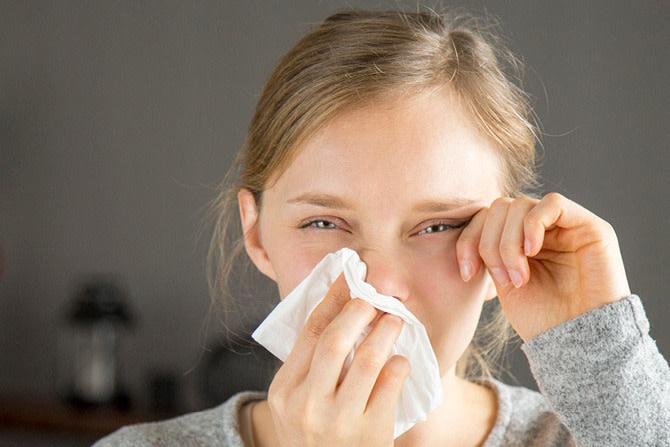50% OFF a Complete Pair of Glasses
*Restrictions apply. Click here for details.
Types of Eye Allergies and Treatments

Eye allergies are a common but irritating condition that can occur seasonally or year-round. The common side effects of eye allergies include itching, redness, and a variety of other conditions that can make it challenging to perform your everyday tasks.
The eye doctors at EyeCare Associates have written this article to provide you with more information on what seasonal allergies are and what at-home treatments you can try.
Visit Our Alabama Eye Doctors
Have you been trying to treat your eye allergies at home for some time? You may be experiencing a more serious eye condition that can negatively impact your health. Get relief and peace of mind by scheduling an appointment with our team of Alabama eye doctors.
Find an EyeCare Associates location near you and schedule your appointment today.
Common Treatments for Eye Allergies
Find relief with these at-home treatments for eye allergies, which include:
Using tear substitute eye drops
Trying to reduce your exposure to indoor and outdoor allergens, depending on your allergy
Taking over-the-counter decongestants and antihistamines
Those with vernal keratoconjunctivitis, atopic keratoconjunctivitis, or giant papillary conjunctivitis can begin treatment at home. Start by taking a break from wearing contact lenses and see if you feel better.
People with these eye allergies should also take extra steps to avoid exposure to allergens. Some prescription eye drops can help reduce the symptoms caused by allergens, so ask your eye doctor to help you find the right eye drops for your allergies.
If at-home remedies are not providing relief, talk to your eye doctor about other treatments available for your condition.
Pataday: The One-Drop Solution for Allergies
If you’re looking for eye drop solution recommendations, EyeCare Associates can help. EyeCare Associates recommend Pataday, an eye drop solution that treats allergy symptoms. It soothes redness and itchy sensations, so that you can enjoy your day without irritation.
If you purchase Pataday eye drops from EyeCare Associates, you pay less than you would from over-the-counter. Pick up your Pataday eye drops from EyeCare Associates to soothe your allergy symptoms today!
6 Types of Eye Allergies
There are six unique types of eye allergies. These include:
Seasonal allergic conjunctivitis (SAC)
Perennial allergic conjunctivitis (PAC)
Contact allergic conjunctivitis
Vernal keratoconjunctivitis
Atopic keratoconjunctivitis
and giant papillary conjunctivitis
Seasonal Allergic Conjunctivitis
Seasonal allergic conjunctivitis (SAC) is just as it sounds: an eye allergy that occurs seasonally. SAC affects most people during the spring, summer, and fall months. During these months, there’s a higher amount of plant pollen in the air, which causes many to experience SAC. The most common types of plant pollen that cause allergic reactions include grass pollen and ragweed.
SAC Symptoms
Someone with SAC may experience these common symptoms:
Itchy or burning sensation in the eyes
Redness of the eye
Clear, watery eye discharge
Dark circles or puffy eyes
Sensitivity to light
Perennial Allergic Conjunctivitis
Perennial allergic conjunctivitis (PAC) is a year-round eye allergy caused by dust mites, mold, pet dander, and other household irritants. This condition has symptoms similar to SAC, which may make it difficult to distinguish which type of eye allergy you’re experiencing.
Vernal Keratoconjunctivitis
Vernal keratoconjunctivitis is an eye allergy with symptoms similar to SAC and PAC. However, these symptoms are more severe than those of SAC and PAC. This type of eye allergy affects your eyes year-round. Those with vernal keratoconjunctivitis may experience worsened symptoms during the spring, summer, and fall. This condition most commonly occurs in boys and younger men.
Symptoms
Some of the common symptoms of vernal keratoconjunctivitis are:
Itchy eyes
A significant increase in tear production
An increase in mucus
“Foreign body sensation” in your eyes
Sensitivity to light
Up to 75% of those with vernal keratoconjunctivitis also experience eczema and asthma.
Atopic Keratoconjunctivitis
Another form of year-round eye allergy is atopic keratoconjunctivitis. This type has symptoms similar to vernal keratoconjunctivitis. This condition is common in older people but especially in men prone to allergic dermatitis. Atopic keratoconjunctivitis can lead to cornea scarring, negatively impacting your vision. Diagnosing and treating this condition as soon as you experience any of its symptoms is essential.
Symptoms
Patients with atopic keratoconjunctivitis may experience the following symptoms:
Severe itching
Burning sensation
Redness
Significant increase in mucus production
Contact Allergic Conjunctivitis
This type of eye allergy only affects those who wear contact lenses. When proteins form on the surface of the contact lens, your eyes become irritated, and contacts become harder to wear.
Symptoms
The common symptoms of contact allergic conjunctivitis include:
Itchy or red eyes
Experiencing discomfort while wearing lenses
Mucous discharge
Giant Papillary Conjunctivitis
Giant papillary conjunctivitis is a more severe form of contact allergic conjunctivitis. It occurs in patients who wear contact lenses, particularly soft lenses. Your contact lenses or contact lens solution may cause this. Like contact allergic conjunctivitis, protein deposits may also play a role. It’s possible for other allergens, especially chronic allergies, to contribute to this condition, making its symptoms more irritating.
Symptoms
Giant papillary conjunctivitis often affects the inside of your eyelid. Your eyelid may look and feel:
Rough
Red
Sore
Swollen
Bumpy
This condition also affects the eyeball, causing it to look and feel:
Irritated, like your eye has something stuck in it or that your contact is moving
Red
Itchy
Other symptoms of this condition include:
An excess discharge of mucus from your eye
Blurry vision
Book Your Eye Exam at EyeCare Associates
Get relief from your eye allergies with professional diagnosis and treatment from EyeCare Associates in Alabama. Our eye doctors will work with you to determine the cause of your eye irritation and develop a treatment plan customized to your lifestyle. Find an EyeCare Associates location near you to begin scheduling your appointment today!
